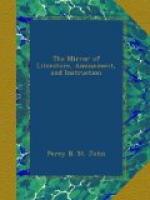Newton has computed that the sun’s heat in the comet of 1680,[2] was, to his heat with us at Midsummer, as twenty-eight thousand to one; and that the heat of the body of the comet was near two thousand times as great as that of red-hot iron. The same great author also calculates, that a globe of red-hot iron, of the dimensions of our earth, would scarce be cool in fifty thousand years. If then the comet be supposed to cool a hundred times as fast as red-hot iron, yet, since its heat was two thousand times greater, supposing it of the bigness of the earth, it would not be cool in a million of years.
An elegant writer in the Guardian, says, “I cannot forbear reflecting on the insignificance of human art, when set in comparison with the designs of Providence. In pursuit of this thought, I considered a comet, or in the language of the vulgar, a blazing star, as a sky-rocket discharged by a hand that is Almighty. Many of my readers saw that in the year 1680, and if they were not mathematicians, will be amazed to hear, that it travelled with a much greater degree of swiftness than a cannon ball, and drew after it a tail of fire that was fourscore millions of miles in length. What an amazing thought is it to consider this stupendous body traversing the immensity of the creation with such a rapidity; and at the same time wheeling about in that line which the Almighty had prescribed for it! That it should move in such inconceivable fury and combustion, and at the same time with such an exact regularity! How spacious must the universe be, that gives such bodies as these their full play, without suffering the least disorder or confusion by it. What a glorious show are those beings entertained with, that can look into this great theatre of nature, and see myriads of such tremendous objects wandering through those immeasurable depths of ether, and running their appointed courses! Our eyes may hereafter be strong enough to command the magnificent prospect, and our understandings able to find out the several uses of these great parts of the universe. In the meantime, they are very proper objects for our imagination to contemplate, that we may form more extensive notions of infinite wisdom and power, and learn to think humbly of ourselves, and of all the little works of human invention.” Seneca saw three comets, and says, “I am not of the common opinion, nor do I take a comet to be a sudden fire; but esteem it among the eternal works of nature.”
P.T.W.
[2] The Comet which appeared in 1759, and which (says
Lambert) returned
the quickest of any that we
have an account of, had a winter of
seventy years. Its heat
surpassed imagination.
* * * * *
SONNETS.
BY LEIGH CLIFFE, AUTHOR OF “PARGA,” “THE KNIGHTS OF RITZBERG,” &c.
(For the Mirror.)




